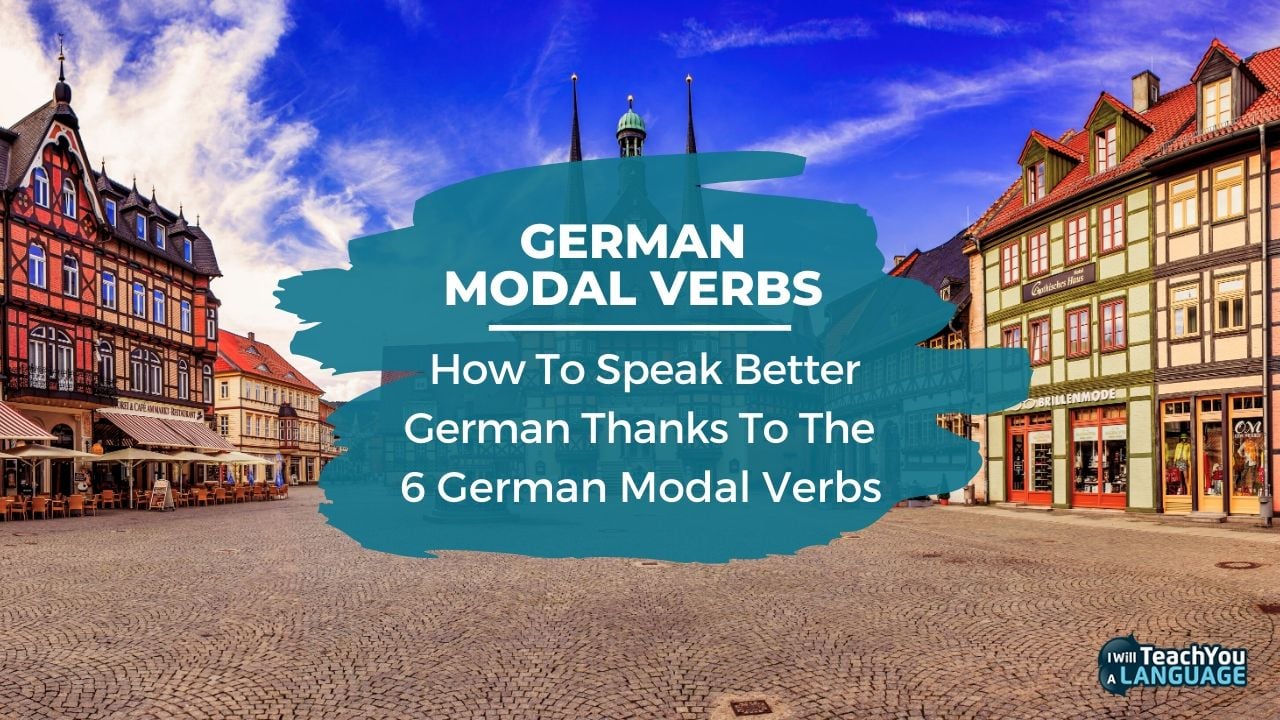
When you're learning German, you have to cover a lot of grammar right? (At least that's what the Grammar Villain wants you to think!)
But some grammar concepts will boost your speaking skills more than others.
That's why, in this post, you'll discover German modal verbs which will it easier to chat to German speakers in day to day life.
Modal verbs in German are words like “want”, “may”, “like”, “must”, “can”, and “should” that allow you to express an obligation or possibility.
For example, when ordering food, talking about your preferences, or asking permission for something, you need a modal verb. So that covers a ton of everyday speaking situations.
These irregular verbs are essential when speaking German, and learning them will instantly enhance your conversational skills.
You'll learn how to use each of the six most common modal verbs in the present, past, and future tenses. I'm also providing plenty of example sentences to help you use these verbs like a native speaker.
Pro Tip
By the way, if you want to learn German fast and have fun while doing it, my top recommendation is German Uncovered which teaches you through StoryLearning®.
With German Uncovered you’ll use my unique StoryLearning® method to learn German modal verbs and other tricky grammar naturally through stories. It’s as fun as it is effective.
If you’re ready to get started, click here for a 7-day FREE trial.

Table of Contents
What Are Modal Verbs In German?
The 6 German modal verbs are:
- können (can)
- dürfen (may)
- mögen (like)
- müssen (must)
- sollen (should)
- wollen (want)
These words allow you to express what you're supposed to do, what you're able to do, and other similar moods. Aside from specific idiomatic expressions, each modal verb has a distinct meaning.
Most of the time, you'll find modal verbs combined with other verbs in a sentence.
Why You Should Learn German Modal Verbs
Modal verbs are unique words that tell us more about the main verbs in a sentence.
You use them every day to ask for permission and express your ability or willingness to do something.
Imagine asking the following questions without a modal verb.
- Can I take you to the movies?
- Do my friends want a drink?
- How long should I wait for the bus?
It's essential to recognize modal verbs and know how to use them. Otherwise, you won't know if someone is asking or demanding something of you.
Knowing these verbs will significantly improve your ability to understand and be understood in German accurately. In the next sections, you'll learn how to use modal verbs in German.
#1 Können – Can
Let's look at one of the most frequently-used modal verbs, können. This verb lets you describe what you can or are able to do.
Present Tense
In the examples below, note how the modal verb is conjugated, but the main verb is in its original, or infinitive form.
- Example: Ich kann Deutsch sprechen. (I can speak German.)
- Example: Du kannst gut kochen. (You can cook well.)
- Example: Wir können morgen ins Kino gehen. (We can go to the movies tomorrow.)
Below, you'll see how to conjugate the verb können for each personal pronoun in the present and past tenses.
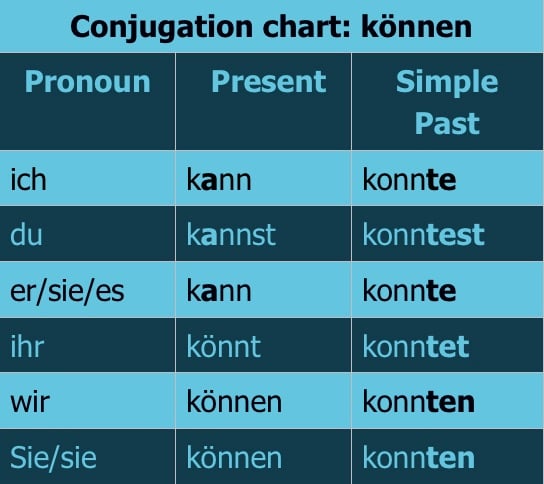
You may have noticed that the first vowel changes from “ö” to “a” in the present tense.
Rule #1 – Every modal verb, except for sollen, changes its first vowel for the pronouns I, you, he, she, and it.

Simple Past
In the simple German past tense, you can see how können loses its umlaut.
Rule #2 – All of the modal verbs drop their umlauts in the past tense.
- Example: Ich konnte Deutsch sprechen. (I was able to speak German.)
- Example: Du konntest gut kochen. (You were able to cook well.)
- Example: Wir konnten ins Kino gehen. (We were able to go to the movies.)
The modal verb comes second in this construction and the main verb takes the last position in the sentence.
Past Participle
Create the past participle with a form of haben and the infinitive form of können. The main verb will also be in the infinitive form to construct what we call the double infinitive. Place both verbs at the end of the sentence together. The modal verb comes last.
- Example: Ich habe Deutsch sprechen können. (I was able to speak German.)
- Example: Du hast gut kochen können. (You were able to cook well.)
- Example: Wir haben gestern ins Kino gehen können. (We were able to go to the movies.)
When the sentence has no main verb, use a form of haben with gekonnt to create the past participle.
- Example: Ich habe Deutsch gekonnt. (I was able to “speak” German.)
- Example: Das hast du gut gekonnt. (You were able to do that well.)
- Example: Wir haben gestern ins Kino gekonnt. (We could have “gone” to the movies.)
It's common in spoken German to leave out the main verb and imply its meaning.
#2 Müssen – Must
When you want to talk about things you have to do, or must do, use müssen in German.
Present Tense
Again, notice how the first vowel changes, this time from an “ü” to a “u.” Remember this change is only for the pronouns I, you, he, she, and it.
- Example: Ich muss arbeiten. (I have to work.)
- Example: Du musst warten. (You must wait.)
- Example: Wir müssen morgen früh aufstehen. (We must get up early tomorrow.)
Let's see how müssen is conjugated.
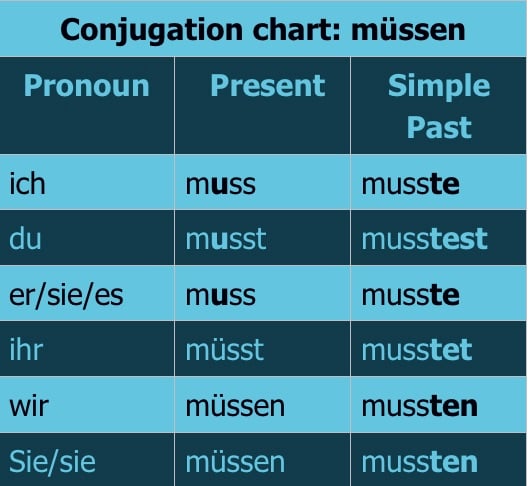
Notice how the endings in the simple past form are the same for müssen as they were for können. Recognizing these patterns make it easier to learn how modal verbs behave.
Simple Past
Next, let's look at some examples in the simple past tense.
- Example: Ich musste arbeiten. (I had to work.)
- Example: Du musstest warten. (You had to wait.)
- Example: Wir mussten früh aufstehen. (We had to get up early.)
Past Participle
Remember that the simple past is most often used in written German. The past participle is more common in spoken German. The same rule for können applies here. Use a conjugated form of haben, then the main verb, and finally the infinitive müssen at the end.
- Example: Ich habe arbeiten müssen. (I had to work.)
- Example: Du hast warten müssen. (You had to wait.)
- Example: Wir haben früh aufstehen müssen. (We had to get up early.)
In some cases, you'll use the past participle form that includes haben and gemusst.
- Example: Ich habe gemusst. (I had to.)
- Example: Er hat gemusst. (He had to.)
- Example: Ihr habt gemusst. (You, plural, had to.)
Only use this form when there is no main verb.
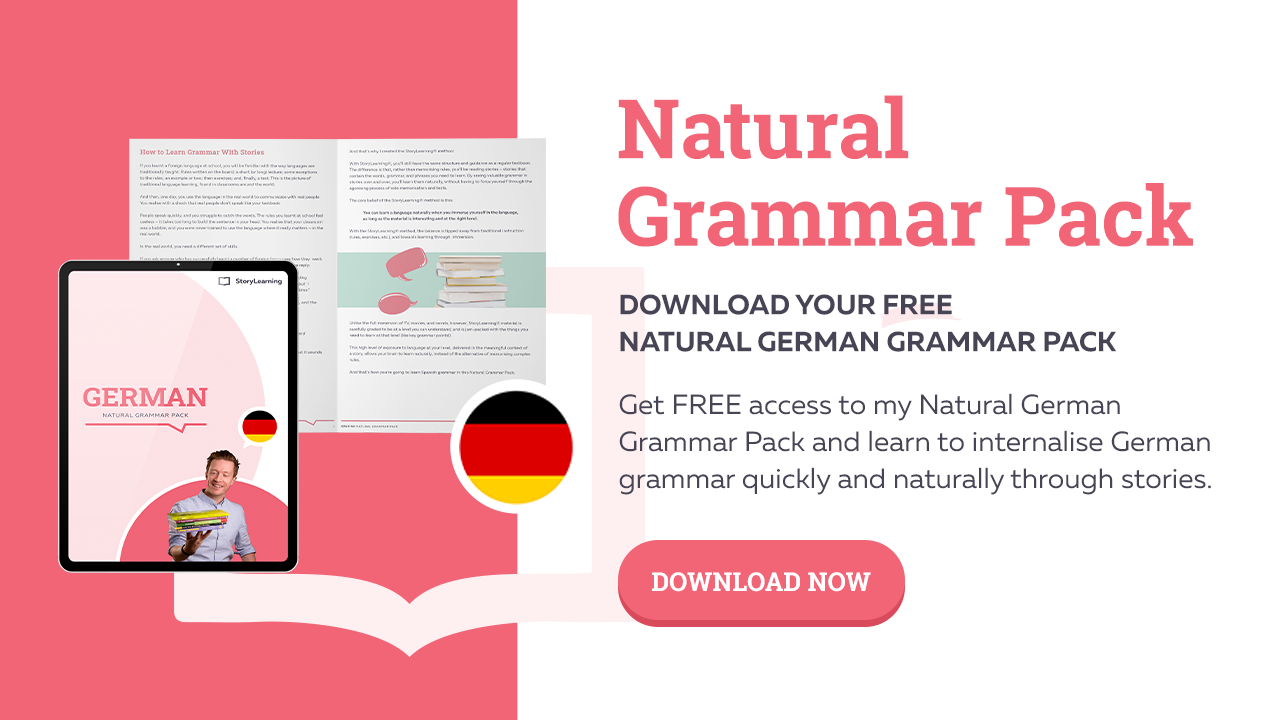
#3 Mögen – Like
Mögen is a modal verb that you use to talk about who or what you like. This modal verb is often used on its own or combined with other verbs.
Present Tense
Notice how the “ö” in mögen changes to an “a” in the present tense.
- Example: Ich mag dich. (I like you.)
- Example: Ihr mögt Pizza. (You, plural, like pizza.)
- Example: Wir mögen Schwimmen. (We like swimming.)
Below is the conjugation table.
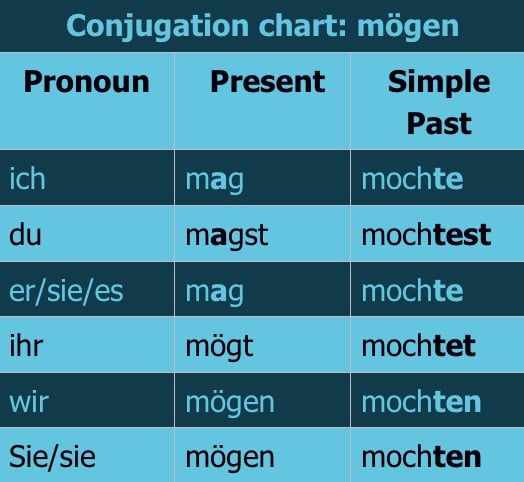
You might have noticed the patterns that the modal verbs follow in the present tense. All you need to remember is how the second vowel changes.
Rule #3 – The root form will always be the same for I, he, she, and it. The you form adds an -st ending. You plural is the original root with a -t ending. We, they, and you formal use the infinitive form of the modal verb.

Simple Past
In addition to dropping its umlaut in the past tense, the “g” in mögen changes to a “ch.” The pronoun endings remain the same. Below are examples in the past tense.
- Example: Ich mochte dich. (I liked you.)
- Example: Ihr mochtet Pizza. (You, plural, liked pizza.)
- Example: Wir mochten Schwimmen. (We liked swimming.)
Past Participle
To form the past participle, use a form of haben with gemocht.
- Example: Ich habe dich gemocht. (I liked you.)
- Example: Ihr habt Pizza gemocht. (You, plural, liked pizza.)
- Example: Wir haben Schwimmen gemocht. (We liked swimming.)
Unlike the past participle forms you've learned so far, mögen doesn't use the double infinitive form. In this case, you should always use the construction shown above.
#4 Sollen – Should
Use sollen to express what someone should do in German.
Present Tense
Sollen is the most regular of all the modal verbs. Notice how there is no vowel change in any of the conjugated forms.
- Example: Ich soll schlafen. (I should sleep.)
- Example: Du sollst gehen. (You should go.)
- Example: Wir sollen uns treffen. (We should meet.)
Below you'll find the conjugation table.
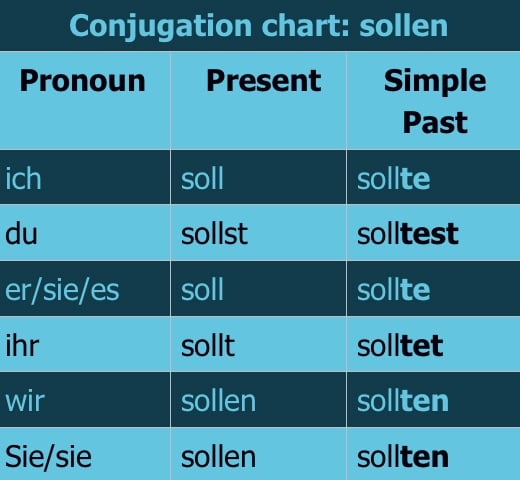
Simple Past
The simple past form of sollen has the same simple past endings as the other modal verbs so far.
- Example: Ich sollte schlafen. (I should sleep.)
- Example: Du solltest gehen. (You should go.)
- Example: Wir sollten uns treffen. (We should meet.)
Unlike the simple past tenses up to now, the meaning of sollen doesn't change in the past form. In the present tense, sollen implies how something should definitively occur. The simple past form suggests that something should happen, but might not.
Past Participle
Use the past participle to talk about what should have been. Most of the time, you'll use a double infinitive and the appropriate form of haben.
- Example: Ich habe schlafen sollen. (I should have slept.)
- Example: Du hast gehen sollen. (You should have gone.)
- Example: Wir haben uns treffen sollen. (We should have met.)
The form haben and gesollt is rarely used.
#5 Wollen – Want
Use wollen to describe what you want.
Present Tense
In the present tense, the “o” in wollen changes to “i” for the I, you, he, she, and it forms.
- Example: Ich will Schokolade essen. (I want to eat chocolate.)
- Example: Du willst einen Salat. (You want a salad.)
- Example: Wir wollen nach Hause gehen. (We want to go home.)
You'll find the conjugation table below.
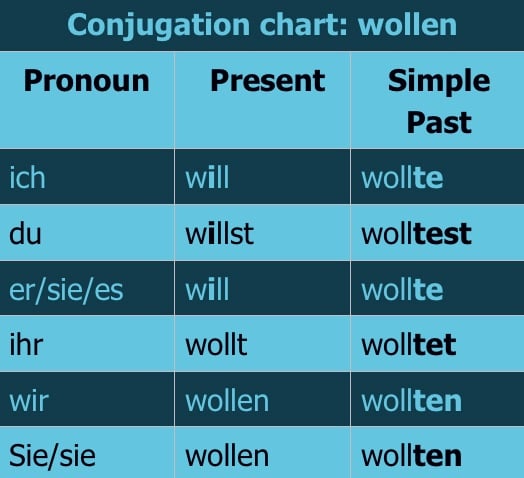
Notice how the simple past is always formed by taking the root of the modal verb, removing the umlaut, and adding the appropriate ending.
Simple Past
The simple past pattern continues here.
- Example: Ich wollte Schokolade essen. (I wanted to eat chocolate.)
- Example: Du wolltest Salat. (You wanted salad.)
- Example: Wir wollten nach Hause gehen. (We wanted to go home.)

Past Participle
Form the past participle with haben and a double infinitive. Only use the combo haben and gewollt in the absence of a main verb.
- Example: Ich habe Schokolade essen wollen. (I wanted to eat chocolate.)
- Example: Du hast einen Salat gewollt. (You wanted a salad.) No main verb is present.
- Example: Wir haben nach Hause gehen wollen. (We wanted to go home.)
#6 Dürfen – May
Our final modal verb is dürfen, or may, in English. We use this verb to ask what is permitted or allowed.
Present Tense
In the present tense, the “ü” changes to an “a” for I, you, he, she, and it.
- Example: Ich darf Fernseh schauen. (I'm allowed to watch TV.)
- Example: Du darfst anfangen. (You may begin.)
- Example: Wir dürfen Pause machen. (We may take a break.)
You'll recognize the modal verb patterns in the table below.
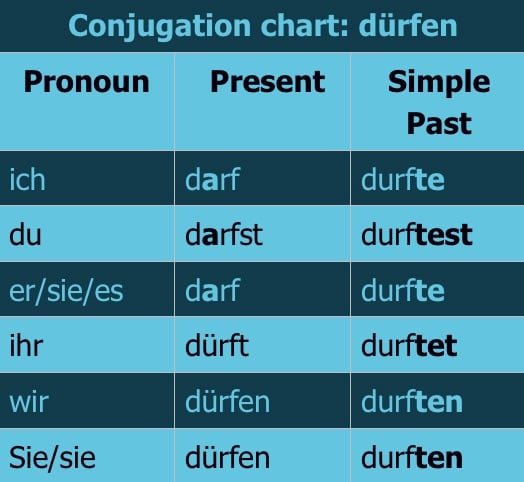
Simple Past
You'll find examples of dürfen in the simple past below.
- Example: Ich durfte Fernseh schauen. (I was allowed to watch TV.)
- Example: Du durftest anfangen. (You were allowed to begin.)
- Example: Wir durften Pause machen. (We were allowed to take a break.)
Past Participle
Form the past participle by choosing the correct form of haben and a double infinitive. The form haben and gedurft is rarely used. Remember that your modal verb now comes at the end of the sentence.
- Example: Ich habe Fernseh schauen dürfen. (I was allowed to watch TV.)
- Example: Du hast anfangen dürfen. (You were allowed to begin.)
- Example: Wir haben Pause machen dürfen. (We were allowed to take a break.)

FAQs About German Modal Verbs
How Many German Modal Verbs Are There?
In the German language, there are six modal verbs. They are: können (can), dürfen (may), mögen (like), müssen (must), sollen (should), and wollen (want).
These verbs express ability, permission, preference, obligation, and desire. Mastering these six verbs will help you communicate better in everyday conversational contexts.
How Common Is The Use Of Modal Verbs In Perfekt?
Using modal verbs in the Perfekt tense is quite common in conversational German.
The Perfekt tense, which you use to talk about events in the past, is the preferred past tense in spoken German. This makes it important to know how to use modal verbs in the Perfekt tense.
When using modal verbs in the Perfekt tense, the structure typically involves the auxiliary verb haben, followed by the main verb, and then the infinitive form of the modal verb.
This double infinitive structure indicates actions related to the modal verb's meaning. For instance, Ich habe das machen können (I was able to do that) is a common construction in spoken German.
What Are The Modal Verbs In The German Language?
The modal verbs in German are:
1. können (can) – Ich kann Deutsch sprechen. (I can speak German.)
2. dürfen (may) – Darf ich hier rauchen? (May I smoke here?)
3. mögen (like) – Ich mag Pizza. (I like pizza.)
4. müssen (must) – Ich muss arbeiten. (I must work.)
5. sollen (should) – Du sollst lernen. (You should learn.)
6. wollen (want) – Ich will ins Kino gehen. (I want to go to the cinema.)
These verbs modify the main verb in a sentence to express nuances in meaning related to possibility, necessity, permission, desire, and obligation.
Modal verbs are a fundamental part of German grammar, and you use them extensively in spoken and written language.
How Do You Use Modal Verbs In Perfekt Tense?
Using modal verbs in the Perfekt tense requires the double infinitive structure.
In this structure, the main verb and the modal verb appear at the end of the sentence in the infinitive form.
To form the Perfekt with a modal verb, you first conjugate the auxiliary verb haben according to the subject. Then, you place the main verb in its infinitive form, followed by the infinitive form of the modal verb at the end of the sentence.
For example:
Ich habe das machen dürfen. (I was allowed to do that).
Du hast Deutsch lernen müssen. (You had to learn German.)
Wir haben ins Kino gehen können. (We were able to go to the movies).
In cases where no main verb is present, the past participle form of the modal verb is used, such as gemusst for müssen or gewollt for wollen. However, this is less common and usually only occurs in specific contexts where the main action is implied.
German Modal Verbs: Time To Go Out There & Use Them!

Wow, we've covered a lot in this post. So let's summarize all the main points you learned about German modal verbs so you can start using them in your German conversations:
- All the modal verbs, except sollen, change their stem vowels for the pronouns I, you, he, she, and it in the present tense.
- All the modal verbs follow nearly identical conjugation patterns in the present and past tense. The only difference is the stem vowel change.
- Use the helping verb haben to form the past participle of modal verbs. In this tense, the helping verb comes first, followed by the main verb, and finally, the infinitive modal verb comes at the end.
- Modal verbs drop their umlauts in the past tenses.
- Mögen doesn't use double infinitives. Instead, use a form of haben with gemocht.
- Sollen has the same meaning in both the present and simple past tenses. Use the past participle to indicate that something has happened in the past.
To master German modal verbs, make sure you're reading plenty of German and listening to it, whether that's through German podcasts or German movies and TV series. That way, you'll hear and see the modal verbs over and over. And this is the key to learning how to use them right.
There you have it. Now go out there and use those German modal verbs to express yourself with incredible accuracy!

Olly Richards
Creator of the StoryLearning® Method
Olly Richards is a renowned polyglot and language learning expert with over 15 years of experience teaching millions through his innovative StoryLearning® method. He is the creator of StoryLearning, one of the world's largest language learning blogs with 500,000+ monthly readers.
Olly has authored 30+ language learning books and courses, including the bestselling "Short Stories" series published by Teach Yourself.
When not developing new teaching methods, Richards practices what he preaches—he speaks 8 languages fluently and continues learning new ones through his own methodology.









































